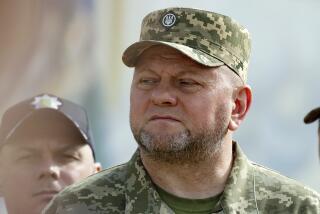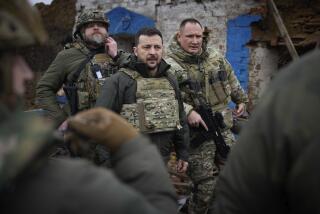Turkish Army Chief Quits; Policy Split Indicated
- Share via
ISTANBUL, Turkey — The Turkish armed forces chief of general staff, Gen. Necip Torumtay, resigned Monday in a dramatic gesture that highlighted deep divisions in the policy-making heart of an important Persian Gulf ally of the United States.
“I am resigning of my own free will because with my principles and my understanding of what the state should be, I cannot continue to serve,” said Torumtay, 63.
The general’s statement was a thinly veiled attack on President Turgut Ozal, who expressed his “deep regret” at the resignation. The shocked government broadcast its acceptance hours after Torumtay had left his headquarters in the Turkish capital of Ankara.
The general did not reveal any specific reason for resigning from his post at the head of 800,000 troops, the North Atlantic Treaty Organization’s second-largest armed force. Diplomats said they could only speculate that it was partly because of a clash in policy over the gulf.
Abandoning Turkey’s traditional stance of regional neutrality in the Middle East, Ozal has been pursuing a zealous anti-Iraqi campaign without much reference to traditional advice from Turkey’s Foreign Ministry or armed forces.
Some diplomats believe it is possible that the extent of military support that Ozal plans to give any U.S. attack on Iraq may have opened up a rift with Torumtay. The resignation followed a series of top-level Turkish meetings to set gulf policy after the U.N. Security Council’s ultimatum to Iraq to leave Kuwait. If force is eventually authorized, it would probably involve Turkey.
About 10,000 U.S. service personnel are based in Turkey, mainly at NATO air bases whose use is considered likely in any military conflict with Iraq. Ozal has publicly ruled out a “second front” against his neighbor but has built up forces along the Iraqi border.
Diplomats point to other reasons for Torumtay’s decision to leave. It follows a string of resignations of respected senior Cabinet ministers because of personal clashes with Ozal, including two foreign ministers and the defense minister this year.
They rarely detail their precise arguments but, in the words of former Prime Minister Bulent Ecevit, Ozal “has concentrated more power in his hands than any Ottoman sultan.” Ecevit and other opposition leaders also accuse the Turkish leadership of nepotism, corruption and Islamic fundamentalist sympathies.
At the same time, Ozal has made himself the virtually irreplaceable partner in Turkey for the alliance facing Iraq, particularly with the United States, which must shoulder the risk of his increasingly fragile domestic position.
Ozal has more public support than most other Turkish leaders but still has only about 20% support in opinion polls. Nevertheless, he is promoting laws to give him greater presidential powers.
One European diplomat said that Torumtay had simply resigned over his difference of opinion, whereas in 1960, 1971 and 1980-83 the Turkish armed forces took power to impose their will.
“But things cannot go on like this,” the diplomat said. “Gen. Torumtay’s resignation is a strong warning to Mr. Ozal from the armed forces that enough is enough.”
More to Read
Sign up for Essential California
The most important California stories and recommendations in your inbox every morning.
You may occasionally receive promotional content from the Los Angeles Times.













